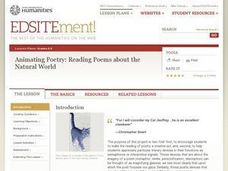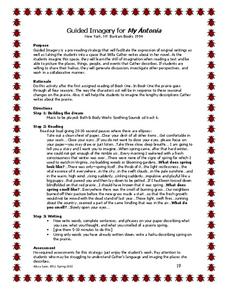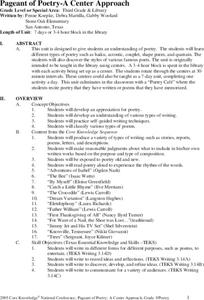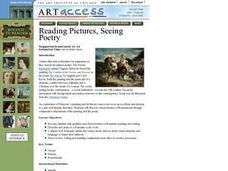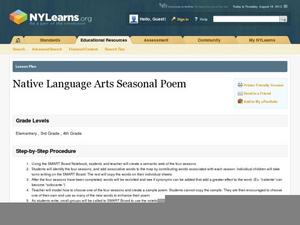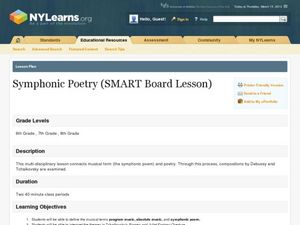Scholastic
Writing to a Historical Poet
Poetry is a very personal and introspective art form. Give your class the opportunity to understand how a poet's voice can speak to them on a personal level, and that every reader can respond to an author differently. After a poetic...
Curated OER
Poetry Gifts
What kind of shoe is this person? What time of day is this person? Aspiring poets’ responses to a list of questions provide descriptive words and phrases that can be crafted into a blank verse poem. A link to sample poems is provided.
Bright Hub Education
Use Pictures or Artwork to Spark Creative Writing
Art in one form can inspire art in another. Use images to inspire writing in your English class. The lesson described here is not detailed; however, the idea is strong. An engaging way to get class members interested in writing, the...
National Endowment for the Humanities
Understanding the Context of Modernist Poetry
Young scholars examine the historical, social, and cultural context of modernist poetry. They explore websites, complete a chart, compare/contrast rural and urban life, watch a video of early New York, and complete a writing assessment...
National Endowment for the Humanities
Animating Poetry: Reading Poems about the Natural World
Students complete poetry analysis activities. In this poetry analysis instructional activity, students consider the use of imagery and sound devices in poetry. Students translate poetry into another art, read a diverse selection of...
California Federation of Chaparral Poets, Inc
Poetic Devices
Have everything you need to know about the elements of poetry with a nine-page handout. Split into four categories—word sounds, meanings, arrangement, and imagery—budding poets may reference terms, read definitions, descriptions, and...
K20 LEARN
Sweet and Savory Writing: Descriptive Writing
The engagement is in the details. Young scholars learn the benefit of weaving descriptive and sensory details into the fabric of their writing through the activities in this lesson. As their hands explore items concealed in bags, a...
Curated OER
My Antonia: Guided Imagery
Willa Cather's novel My Antonia is full of vivid imagery. Encourage your pupils to visualize and translate images from the text into original writing with this guided imagery activity. Learners listen to an excerpt, take a moment to...
Curated OER
Poetry as a Fine Art
Sixth graders use a visit to the National Gallery of Art to inspire descriptive writing. They choose works of art and write descriptive word lists, paragraphs and Haiku.
Curated OER
Descriptive Writing
Have your class practice using descriptive language in their writing. This resource provides learners with a list of terms and adjectives. For example, one slide shows a picture of a wolf, and then lists descriptions, such as moon howler...
Curated OER
An Introduction to Poetry
Students examine the genre of poetry. They read and discuss list poems, write a list poem, research and read poetry online, and write a free form poem.
University of Arizona
Fusing Firecrackers with Narrative
Improve your youngsters' descriptive writing. They study an object and write about what they see as a warm-up, then they read an excerpt from Paul Guest's memoir, One More Theory about Happiness. The next part of the...
Channel Islands Film
Lone Woman of San Nicolas Island: Lesson Plan 2
After watching West of the West's documentary The Lone Woman of San Nicolas Island, class members imagine how Juana Maria/Karana may have felt about living alone on the island for 18 years and craft a blackout poem or a narrative in...
Alabama Wildlife Federation
Water Words
Water is an interesting substance that all living things need to survive. Learners focus on the characteristics of water as they create a list of words related to water and then incorporate them into descriptive paragraphs. They then use...
Curated OER
Riddle Poem
Second graders practice writing skills by writing riddle poems using adjectives to describe vegetables.
Curated OER
A Center Approach to Poetry
Students experience the different types of poetry in order to classify them. In this poetry lesson, students discover the multiple types of poetry while reading in the library. Ultimately, the students create their own poetry and share...
Curated OER
Puffins
In this writing worksheet, students write an original acrostic poem about Puffins. Students write a descriptive word or adjective for each letter on the lines provided.
Curated OER
Stage a Poetry Slam!
Students write and perform poetry. In this poetry presentation lesson, students learn about the concept of a poetry slam. Students plan and hold their own poetry slam.
Curated OER
Reading Pictures, Seeing Poetry
Students examine the painting, The Combat of the Giaour and Hassan based on a poem by Lord Byron. They compare how Romantic artists and writers made choices about visual elements and language to depict their subjects.
Curated OER
Native Language Arts Seasonal Poem
Intended for native Spanish speakers, this plan provides an opportunity to create a class semantic web describing the different seasons and listen to Vivaldi's "Four Seasons." Learners will work together to revise their semantic webs,...
Curated OER
Sense Poetry
Access your young poets' senses and emotions with this activity, which guides them through the process of writing a "sense poem." After working on a sense poem as a class and modeling the procedure, individuals work on their own poems...
Curated OER
Symphonic Poetry (SMART Board Lesson)
Let music and poetry collide in this well-orchestrated language arts lesson plan. After studying program music and C. Debussy's Prelude to an Afternoon Faun, view the attached SMART board lesson plan to read through "Fog" by Carl...
Curated OER
Write Your Own Description
In this writing worksheet, students learn about a poem by Gwendolyn Brooks titled "Skipper" which is about her goldfish. Students draw the water, life and objects in a fish bowl shape, then describe what people would see if they looked...
Curated OER
Seasonal Poetry Reflective Journal
Pull quotes from a text and craft responses to the quotes you chose. First, read a short excerpt from Mary Claire Wilfert's oral history. Then, read the contemporary poem "Robert's Cove," pulling quotes and writing responses as...






